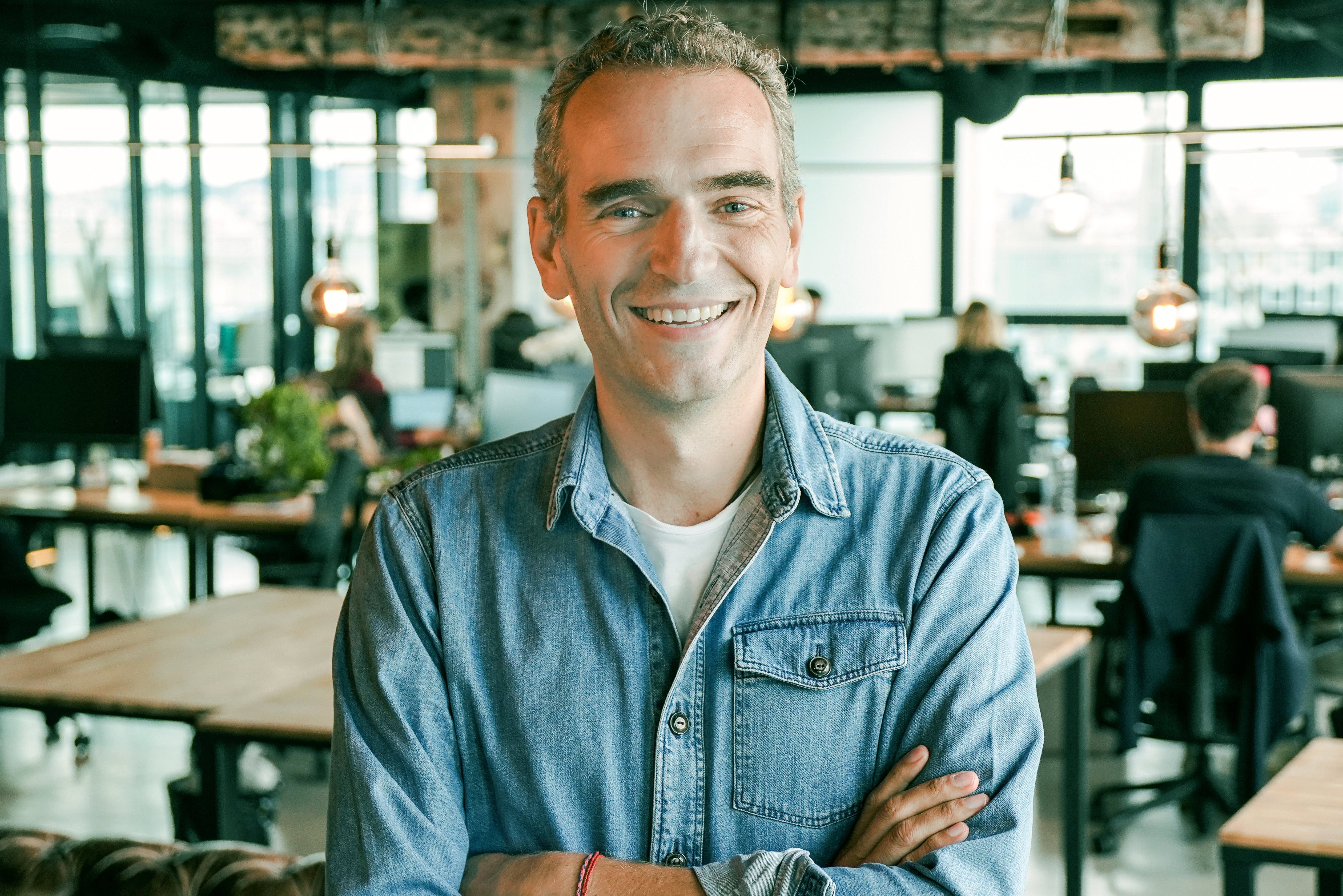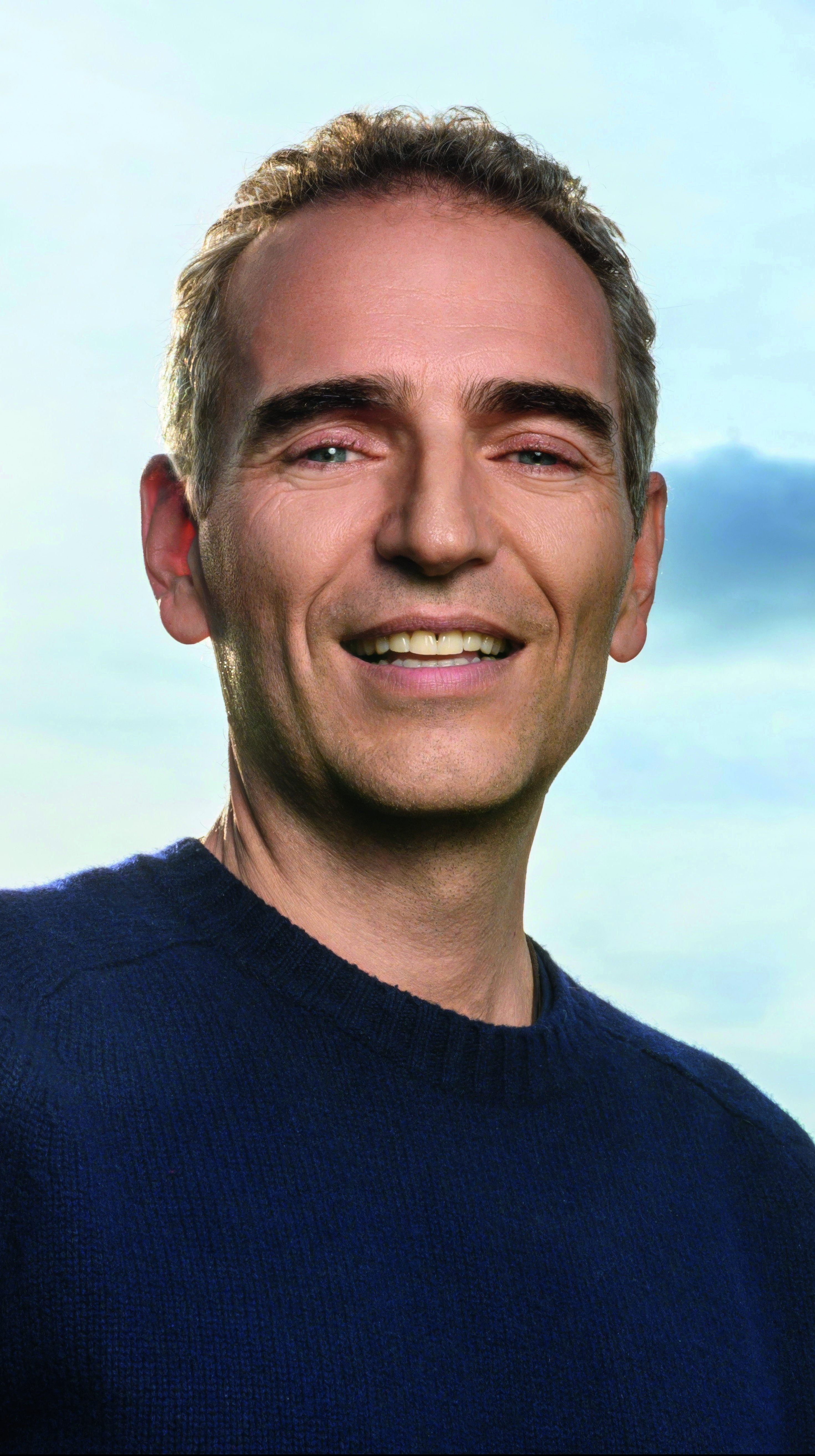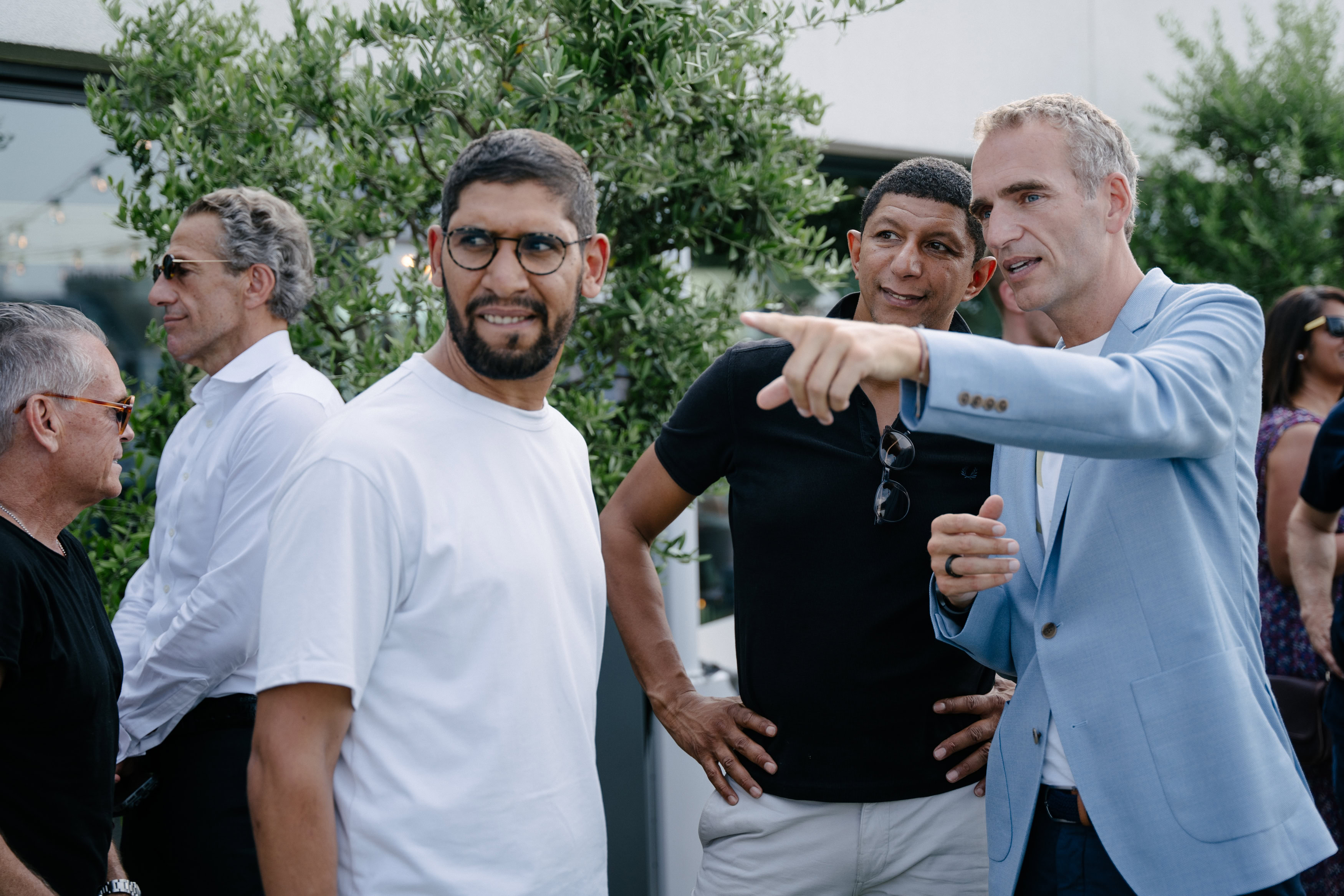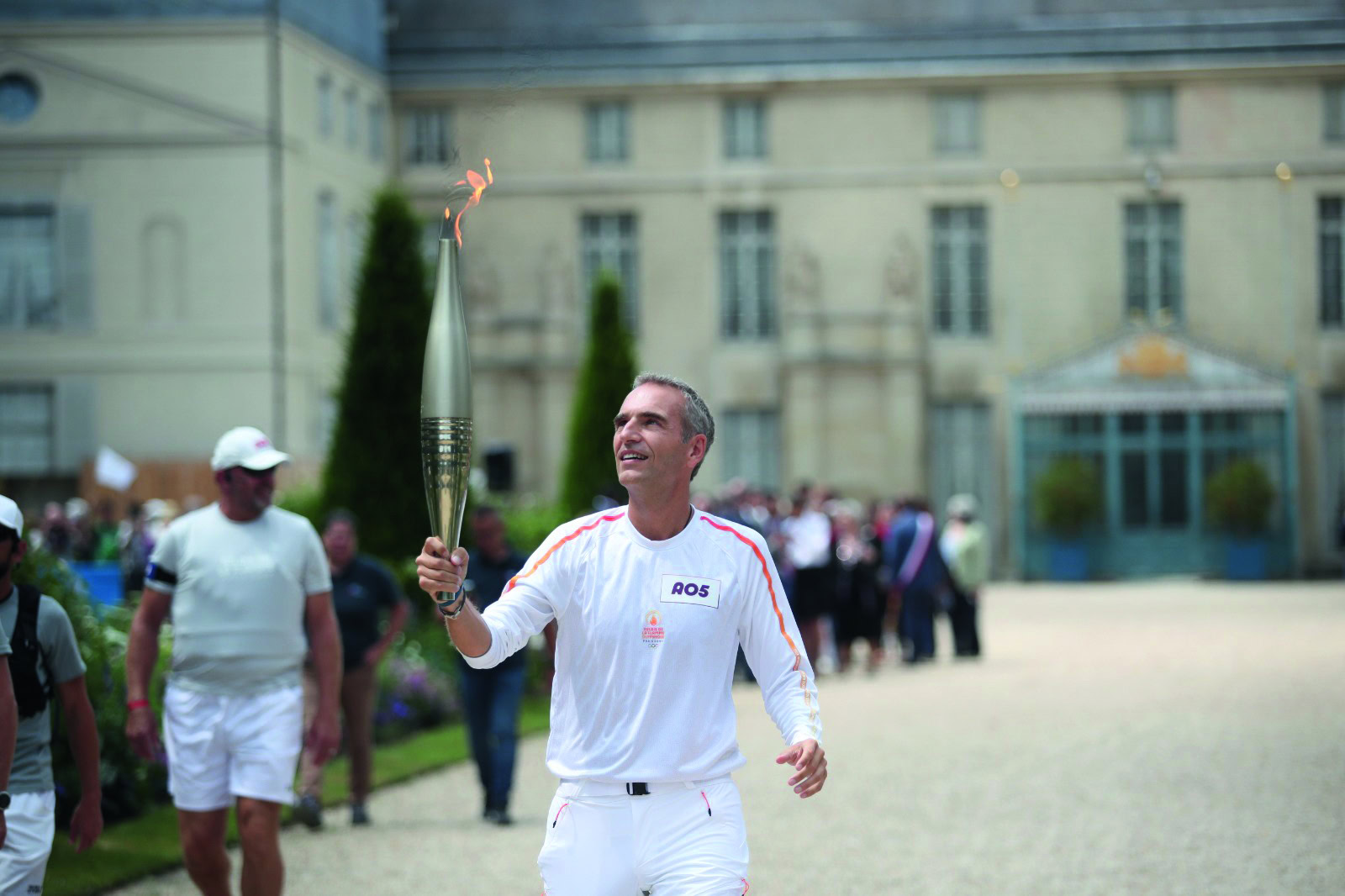Alexandre Mars (H.99), job : philanthropreneur

Business leader, speaker, creator of a successful podcast, writer, philanthropist, and member of the Paris 2024 Board of Directors, Alexandre Mars (H.99) follows multiple paths at once. Meet him in Paris.
“How is it going?,” he casually asks, informal from the start. Just like he has been knowing you forever. Welcome to planet Mars! The nearly fifty-year-old successful serial entrepreneur and passionate philanthropist has a unique ability to break with conventions from the first meeting. No red tape, no preamble. No awkward silences. He knows how to make the moment fluid, genuine, simple. We sit down around a minimalist desk in a room decorated with a few pieces of Asian art. Outside, the large terrace, covered with synthetic grass, hums with the sounds of Paris. We are on the eighth floor of an elegant building on Avenue de la Grande-Armée. The view of the Arc de Triomphe is breathtaking. This is where Alexandre Mars works. “Never alone,” he specifies. The adjoining open space, his “nerve center” where he conducts all his activities, is bustling. The walls are painted black, and a focused silence prevails. About forty people form his close-knit team here.
Where to begin? He already lived a thousand lives and currently seems to be leading at least as many. In addition to startups, investment funds, and foundations, his podcast, titled Pause, claims 150,000 cumulative listens each month. A hit. Behind the microphone, he plays the role of a confessor rather than an interviewer. And he does so with the elite of the business world from BpiFrance CEO Nicolas Dufourq (H.84) to McKinsey France Managing Partner Clarisse Magnin-Mallez (H.00) or ChangeNow founder Santiago Lefebvre. But also with artists, from French actor Dany Boon to musician Matthieu Chédid, and humorist Gad Elmaleh, athletes, from rugby player Antoine Dupont, French Rugby Federation president Florian Grill (H.88) to decathlete Kevin Mayer, Michelin-starred chefs like Alain Ducasse, adventurers like Mike Horn and writers like Marc Levy. Alongside these eclectic encounters, he chaired the sports and society commission as part of Paris’s bid to host the Olympic and Paralympic Games, before being appointed by Tony Estanguet to the Paris 2024 Board of Directors in 2018.
He also works out (running and Krav Maga) six times a week, travels incessantly to give more than 80 conferences a year around the world, and still indulge himself in a weak long break on the Way of St. James. In short, you would expect to meet someone overwhelmed, trapped by a frantic schedule, constantly interrupted by calls from New York, London, or Brussels, three cities where he also has offices. But that’s not the case. He has scheduled a full hour to talk.
With cerulean blue eyes, a matching sweater, a calm and tanned face, and hands resting quietly on the table, Alexandre Mars embodies the title of his latest (and third) book: Pause, for a Life in Alignment (Fayard Publishing). A book that serves as a guide. A method, his own, born from his encounters, failures, and successes. Throughout the pages, he implicitly shares his journey while denouncing the distorted mirror that is public image, especially in the age of social media. He confesses from the first line: “I have long hidden behind an image. I ‘succeeded,’ and it was this success alone that I had to display.” A way for him to remind the reader of a paradoxical reality. “For an entrepreneur, to be aligned is a difficult challenge that often clashes with the true entrepreneurial landscape,” he observes. “We constantly face a multifaceted, complex reality that leaves little time to breathe and step back, let alone to reveal our flaws. There is also a cult of the know-it-all posture, this kind of strength and certainty that a business leader is supposed to display at all times in front of their teams or clients.” So, how did he achieve balance? “I think it’s the quest of a lifetime,” he says, before adding: “It’s about finding what’s within yourself and moving towards that.”
Maternal Influence
Alexandre Mars’s trajectory took shape early on. His first business specialized in concert organization and dates back to his high school years. At just 17, the native of Boulogne-Billancourt, not particularly a studious student, revealed himself as a gifted entrepreneur. The capital he raised allowed him to found a second company named A2X at 22, one of the first French web agencies. He sold it in 1998 to explore venture capital. In 2002, he created Phonevalley, a mobile phone advertising and marketing agency, which he sold to Publicis in 2007. In 2006, he founded ScrOOn, a platform specializing in social media community management, which he sold in 2013 to Blackberry. Behind this ascent, which played out between the United States and Europe, Alexandre Mars now sees another constant: perseverance. “I’m a hard worker,” he acknowledges. A determination and energy he largely attributes to meeting the “woman of his life,” Florence Chataignier Mars (H.99), whom he met in high school and with whom he has four children (20, 18, 14, and 5 years old). “Florence was brilliant in school, whereas for me it was much more laborious,” he recalls. “She got into HEC easily. I had to fight and work like crazy to keep up with her…”
For several years now, this leader in digital services and venture capitalist has been channeling his energy into values he holds close to his heart. “I have always felt the need to have an impact on society and to ensure that my success serves a purpose.” Where does this vocation come from? “Undoubtedly from my family history. From my mother in particular. After my parents’ divorce, I grew up with her. I always saw her opening her door to help others. Even today, at 80, she spends her time helping whoever comes her way and welcome them into her home. She is a role model, an exceptional person. Not to mention that at the time of the divorce, I quickly felt the financial injustice it caused: suddenly, it became more complicated for my mother… That’s why, I think, my priority was first to protect the people I loved by earning money. Then I made a profound shift by making the fight against social injustice my life’s mission.”
85 Million in Charity
In 2014, Alexandre Mars founded the Epic Foundation, a “nonprofit startup” as he describes it. The goal is to connect two worlds that didn’t necessarily interact, on one side those who have resources, on the other those who need them.” Today, Epic continues to bridge the gap between NGOs working on issues such as access to education, health, employment, or environmental protection, and individuals or companies that want to get involved. Since its creation, the foundation has mobilized more than 85 million dollars and supported around fifty associations or social enterprises by implementing innovative models such as payroll or checkout rounding, as well as the sharing pledge, which involves asking companies and individuals to donate a portion of their income, profits, shares, or financial gains (1% or more).
Another area of action is responsible investing. With Blisce/, a fund driven by the idea that financial performance and positive social impact are not incompatible. By investing in companies recognized for their commitments, such as Spotify, Pinterest, Too Good To Go, Headspace, or Brut, the entity created by Alexandre Mars became the first European venture capital fund to receive the B Corp label in 2020. Finally, last year saw the launch of Infinite, an organization to finance a higher education for those in needs. It aims to help students from disadvantaged backgrounds access the best schools and universities and prepare them for the workforce through a zero-interest, no-guarantor student loan, which can go up to 45,000 euros for two to four years of study. A virtuous model where the repayments of some help finance the loans of others. “My desire to help the less fortunate, to correct the injustice of birth, and to contribute a bit to changing the world has been a vision I’ve held since my adolescence,” confides the entrepreneur-philanthropist. Why, then, hasn’t he entered politics? “Good question, it’s clear that my commitment has a political dimension,” he concedes, “but I think I’m more useful acting discreetly with leaders around the world, whom I’m fortunate to have access to.”
An hour has already passed. There’s still so much more to say. Alexandre Mars concludes the interview with a quote, one of the many mantras scattered throughout the chapters of his latest book: “‘What is important is not what happens to us, but how we respond to what happens to us.” Words from Sartre, the existentialist philosopher, a movement that advocates engagement and action. A mode of thinking that thrives on planet Mars.
1974
Born in Boulogne-Billancourt
1992
Creation of a company specialized in concert organization at 17
2015
Named in
the Top 20 Philanthropists Under 40 by “The New York Observer”
2018
Published “La Révolution du partage” (Flammarion).
Ranked among the 50 most influential French people in the world by “Vanity Fair”
2024
Published “Pause, pour une vie alignée” (Fayard)

Published by Sébastien Desurmont



